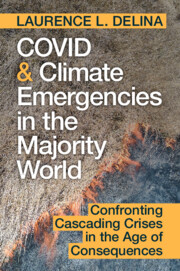 COVID and Climate Emergencies in the Majority World
COVID and Climate Emergencies in the Majority World Book contents
- COVID and Climate Emergencies in the Majority World
- Reviews
- COVID and Climate Emergencies in the Majority World
- Copyright page
- Dedication
- Contents
- Preface
- Acknowledgements
- 1 Portrait of a Grief
- 2 Collapsing Dominoes
- 3 Vulnerabilities Amplified
- 4 Walled World
- 5 Obscene Opulence
- 6 Climate Nationalism
- 7 Toggling the System
- 8 Decluttering Consumption
- 9 Confronting Neo-Liberalism
- 10 Ceasing Arrogance
- 11 Making Amends
- 12 Collective Solidarities
- 13 Decolonising from Within
- 14 Indigenous Epistemology
- 15 Communicating Risks
- 16 The Hubris of Control
- 17 Mobilising the 3.5 Per Cent
- Index
- References
17 - Mobilising the 3.5 Per Cent
Published online by Cambridge University Press: 22 June 2023
- COVID and Climate Emergencies in the Majority World
- Reviews
- COVID and Climate Emergencies in the Majority World
- Copyright page
- Dedication
- Contents
- Preface
- Acknowledgements
- 1 Portrait of a Grief
- 2 Collapsing Dominoes
- 3 Vulnerabilities Amplified
- 4 Walled World
- 5 Obscene Opulence
- 6 Climate Nationalism
- 7 Toggling the System
- 8 Decluttering Consumption
- 9 Confronting Neo-Liberalism
- 10 Ceasing Arrogance
- 11 Making Amends
- 12 Collective Solidarities
- 13 Decolonising from Within
- 14 Indigenous Epistemology
- 15 Communicating Risks
- 16 The Hubris of Control
- 17 Mobilising the 3.5 Per Cent
- Index
- References
Summary
Anyone who has been observing the activities of the ruling class – both in government and in business – can see that it is disorganised, and, when viewed in isolation, tactically incapable and unwilling to address even short-term crises, let alone a significant existential dilemma such as the climate crisis. A revitalised social movement could promote swift and equitable climate action: what it needs to do is to mobilise 3.5 per cent of the population – although, of course, whether this number is enough to address any particular world crisis is unknown.
- Type
- Chapter
- Information
- COVID and Climate Emergencies in the Majority WorldConfronting Cascading Crises in the Age of Consequences, pp. 147 - 154Publisher: Cambridge University PressPrint publication year: 2023


